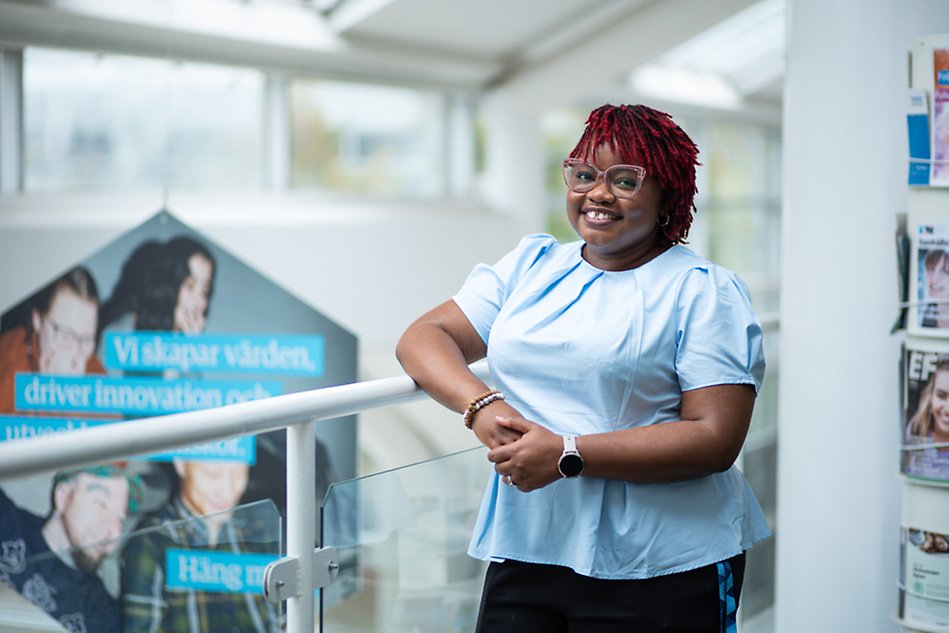Naomi Chikumbi Zulu
Naomi Chikumbi Zulu is doing her PhD studies in Informatics, specifically in intelligent automation and the future of work. Her research focuses on how artificial intelligence shapes professional competence. Originally from Zambia, she describes how her experiences from her home country and the opportunities in Sweden have shaped her into a more resilient and creative researcher.

Naomi Chikumbi Zulu.
Hi, Naomi! What is your research field?
“My research is in intelligent automation and the future of work, focusing on how artificial intelligence influences professional competence. I look particularly at knowledge-intensive professions, white collar professions to be precise. For me, it’s not just about technology, but about people – how they adapt, feel about their roles, and what skills matter when machines are in the room.”
What is it like to be a PhD student?
“Honestly, it’s a mix of emotions. Some days I feel inspired, full of ideas and energy. Other days, I feel stuck, staring at the same sentence for hours. But that’s the beauty of it – it helps you grow.”
“What I value here in Sweden is the space to grow, the culture of openness, and the chance to shape my project to reflect my interests. Coming from Zambia, I also carry resilience and resourcefulness, qualities you learn in contexts where you sometimes must do more with less. Having both sides makes me appreciate the journey more deeply.”
What is a typical day like for you?
“There isn’t really a ‘typical’ day, and I think that’s what makes it exciting. Some days are heavy with reading, others I’m buried in writing, and sometimes I’m teaching or discussing with colleagues. I really enjoy that variety. Of course, with the flexibility comes the challenge – you have to motivate yourself and create your own structure. I’ve learned that productivity isn’t about squeezing in more hours but creating balance so you can think clearly.”
You are originally from Zambia. What is it like to come to Sweden to do your PhD?
“It’s been both exciting and humbling. Sweden gives me access to great research infrastructure, funding and international networks, which I really appreciate. At the same time, my educational foundation back home in Zambia shaped me in different but equally important ways – it gave me adaptability, resilience, and creativity. So, I don’t see it as ‘better or worse’. For me, Zambia prepared me to push through challenges and think practically, while Sweden gives me systems and resources to refine and expand that work. Together, they don’t cancel each other out – they complement each other. And that combination has really made me a stronger researcher.”
What is it like to teach?
“Teaching has been a surprising joy in my PhD journey, it’s honestly one of the things that gives me energy. When students engage, ask questions or even challenge me, it also pushes me to grow. It’s never just me giving knowledge – it becomes a two-way process. And I love those unexpected moments when a discussion goes in a direction I didn’t plan – that’s when real learning happens, for both me and the students. Sometimes I walk out of class thinking, ‘Wait, who was teaching who today?’ and that, for me, is the beauty of it.”
Do you have any advice for new PhD students?
“I’d say give yourself permission to be human. This journey will stretch you thin, and there will be days when you feel crushed by the workload or your own doubt. Don’t be afraid of those moments – they don’t make you weak, they make you real. The important thing is how you rise again, even if it’s slowly. Every comeback makes you stronger.
At the same time, don’t forget to live your life outside your doctoral studies. Go for a walk, call a friend, laugh or binge that Netflix series without guilt. You’ll be surprised how often your best ideas come when you’re not staring at your laptop. Some days you’ll write pages, other days you’ll just have coffee and guilt – that’s normal too.
And finally, don’t forget where you come from. Your background, experiences and perspective are not things to hide, they’re what make your research unique. For me, the PhD journey is really about balancing persistence with self-compassion – and not just surviving on coffee, deadlines and guilt.”
Text: Anna-Frida Agardson
Photo: Anna-Frida Agardson

